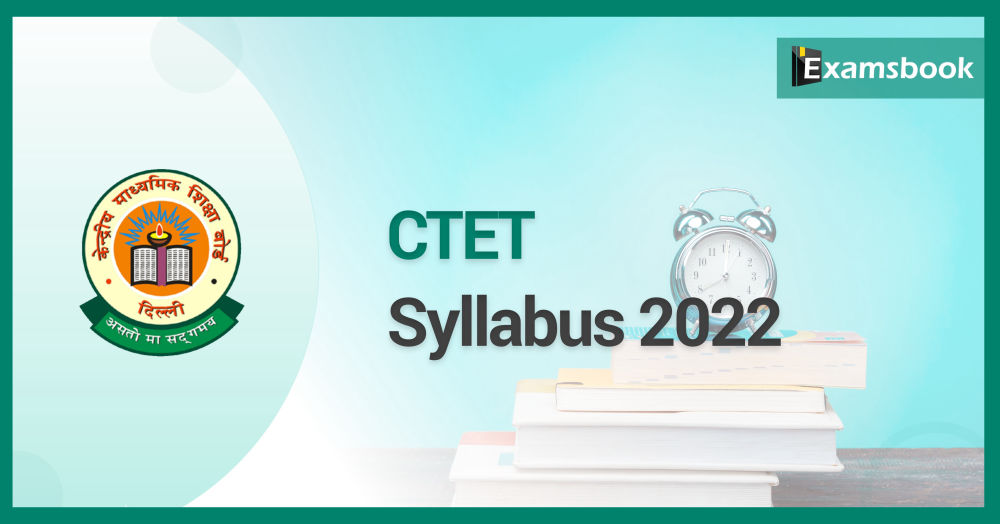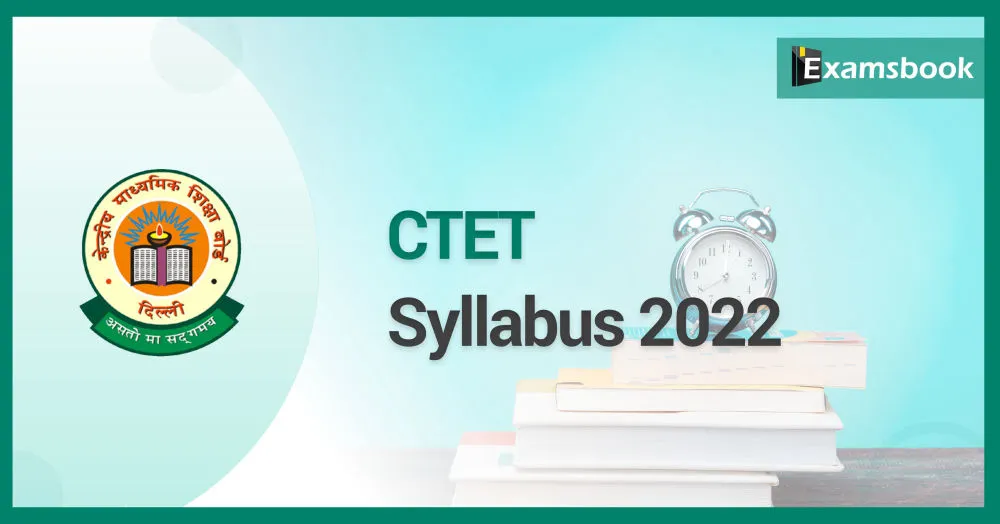


As we know, the Government of India offers a golden opportunity to the qualified male-female candidates of the country for the post of teacher (class 1 to 8) through the Central Teacher Eligibility Test (CTET) Examination, which is held by the CBSE (Central Board of Secondary Education) twice a year.
Central Teaching Eligibility Test (CTET) is split into two levels or papers. Paper I is for candidates who wish to teach classes 1 to 5, and Paper II is for candidates who want to teach classes 6 to 8. In case candidates desire to qualify to teach classes 1 – 8, they can appear for both papers in CTET.
This blog aims to tell you about the latest CTET Syllabus and Exam Pattern for your forthcoming CTET Exam 2022 . Here I'm sharing, What are the detailed CTET Syllabus 2022 and CTET Exam Pattern 2022? Study the CTET exam criteria as this helps to make plans for studying, and candidates can clearly see which topic they should focus on more.
Let’s understand the CTET Exam Pattern & Syllabus 2022 one by one ↴
The CTET Paper I & II are conducted in offline mode as a pen-and-paper-based test. Paper 1 consists of 5 sections while Paper 2 consists of 4 sections.
Check out the below table for a clear understanding of the latest CTET exam pattern:
The written exam will be the following topic, in which the details of the marks are: -
| Subjects | Total Number of Questions | Total Number of Marks | Duration |
| Child Development and Pedagogy | 30 | 30 | 2.5 hours |
| Language I (compulsory) | 30 | 30 | |
| Language II (compulsory) | 30 | 30 | |
| Mathematics | 30 | 30 | |
| Environmental Studies | 30 | 30 | |
| Total | 150 | 150 |
The written exam will be the following topic, in which the details of the marks are: -
| Subjects | Total Number of Questions | Total Number of Marks | Duration |
| Child Development and Pedagogy | 30 | 30 | 2.5 hours |
| Language I (compulsory) | 30 | 30 | |
| Language II (compulsory) | 30 | 30 | |
| A. Mathematics & Science | 30 + 30 | 60 | |
| B. Social Studies & Social Science | 60 | 60 | |
| Total | 150 | 150 |
Knowing the CTET syllabus completely is an important step before preparing for the CTET exam. If you are going to appear in the upcoming CTET exam, then first stop towards the syllabus.
Candidates should keep in mind that the subjects of both papers can be the same but the level of questions may be different in them, so do not get confused. This level of questions will be according to class.
CTET Paper-I exam is divided into 5 sections i.e. Language I & II, Child Development and Pedagogy, Mathematics, and Environmental Studies. Let's have a look at CTET Syllabus 2022:
a) Child Development (Primary School Child): 15 Questions
b) Concept of Inclusive education and understanding children with special needs: 5 Questions
c) Learning and Pedagogy: 10 Questions
a) Language Comprehension: 15 Questions
Reading unseen passages – two passages one prose or drama and one poem with questions on comprehension, inference, grammar, and verbal ability (Prose passage may be literary, scientific, narrative, or discursive)
b) Pedagogy of Language Development: 15 Questions
a) Comprehension: 15 Questions
Two unseen prose passages (discursive or literary or narrative or scientific) with questions on comprehension, grammar, and verbal ability
b) Pedagogy of Language Development: 15 Questions
a) Content: 15 Questions
b) Pedagogical issues: 15 Questions
Nature of Mathematics/Logical thinking; understanding children’s thinking and reasoning patterns and strategies for making meaning and learning
a) Content: 15 Questions
I. Family and Friends:
• Relationships
• Work and Play
• Animals
• Plants
II. Food
III. Shelter
IV. Water
V. Travel
VI. Things We Make and Do
b) Pedagogical Issues: 15 Questions
CTET Paper-I exam is divided into 4 sections i.e. Language I & II, Child Development and Pedagogy, and Mathematics & Science / Social Studies & Social Science. Let's have a look at CTET Syllabus 2022:
This topic is common in Paper-1 and Paper-2 which is compulsory to be attempted. Through this section, the candidate's knowledge about Child development and the Concept of Inclusive education will be covered. Go through the topics below to understand the syllabus in a clear manner.
a) Child Development (Elementary School Child): 15 Questions
b) Concept of Inclusive education and understanding children with special needs: 5 Questions
c) Learning and Pedagogy: 10 Questions
To test the candidate's knowledge in the language they have opted there will be 30 questions in the CTET Paper-I and Paper-II.
a) Language Comprehension: 15 Questions
Reading unseen passages – two passages one prose or drama and one poem with questions on comprehension, inference, grammar and, verbal ability.
b) Pedagogy of Language Development: 15 Questions
The second language test will be for accessing the candidate's knowledge of the English language. There will be 30 questions in the CTET Paper-I and Paper-II.
a) Comprehension: 15 Questions
Two unseen prose passages (discursive or literary or narrative or scientific) with questions on comprehension, grammar and verbal ability
b) Pedagogy of Language Development: 15 Questions
The candidates can check the topics to be covered in Mathematics and Science section. The questions of Maths should be attempted with tricks and accuracy. There will be 30 questions from Maths and 30 from Science subject.
(i) Mathematics: 30 Questions
a) Content: 20 Questions
• Number System
• Knowing our Numbers
• Playing with Numbers
• Whole Numbers
• Negative Numbers and Integers
• Fractions
• Algebra
• Introduction to Algebra
• Ratio and Proportion
• Geometry
• Basic geometrical ideas (2-D)
• Understanding Elementary Shapes (2-D and 3-D)
• Symmetry: (reflection)
• Construction (using Straight edge Scale, protractor, compasses)
• Mensuration
• Data handling
b) Pedagogical issues: 10 Questions
• Nature of Mathematics/Logical thinking
• Place of Mathematics in Curriculum
• Language of Mathematics
• Community Mathematics
• Evaluation
• Remedial Teaching
• Problem of Teaching
(ii) Science: 30 Questions
a) Content: 20 Questions
I. Food
• Sources of food
• Components of food
• Cleaning food
II. Materials
• Materials of daily use
III. The World of the Living
IV. Moving Things People and Ideas
V. How things work
• Electric current and circuits
• Magnets
VI. Natural Phenomena
VII. Natural Resources
b) Pedagogical issues: 10 Questions
• Nature & Structure of Sciences
• Natural Science/Aims & objectives
• Understanding & Appreciating Science
• Approaches/Integrated Approach
• Observation/Experiment/Discovery (Method of Science)
• Innovation
• Text Material/Aids
• Evaluation – cognitive/psychomotor/affective
• Problems
• Remedial Teaching
In this subject, the topics are divided into two parts: One includes History, Geography, Social & Political Life and the Second one includes Pedagogical issues. The ratio of questions will be 40:20 respectively.
I. History
A strong catch on historical events, days, and dates to score good marks in this section. The questions will be asked from the below topics
• When, Where and How
• The Earliest Societies
• The First Farmers and Herders
• The First Cities
• Early States
• New Ideas
• The First Empire
• Contacts with Distant lands
• Political Developments
• Culture and Science
• New Kings and Kingdoms
• Sultans of Delhi
• Architecture
• Creation of an Empire
• Social Change
• Regional Cultures
• The Establishment of Company Power
• Rural Life and Society
• Colonialism and Tribal Societies
• The Revolt of 1857-58
• Women and reform
• Challenging the Caste System
• The Nationalist Movement
• India After Independence
II. Geography
Though it is difficult for anyone to understand the complete geography of India unless they go deep into it. However, CBSE has included a Geography subject for CTET Paper-II but no worries, you have to prepare only for a few topics that have been provided below.
• Geography as a social study and as a science
• Planet: Earth in the solar system
• Globe
• Environment in its totality: natural and human environment
• Air
• Water
• Human Environment: settlement, transport and communication
• Resources: Types-Natural and Human
• Agriculture
III. Social and Political Life
This section will test the candidate's knowledge about its surroundings and the topics that a candidate must be knowledgeable about has been listed below.
• Diversity
• Government
• Local Government
• Making a Living
• Democracy
• State Government
• Understanding Media
• Unpacking Gender
• The Constitution
• Parliamentary Government
• The Judiciary
• Social Justice and the Marginalised
b) Pedagogical issues
There will be 20 questions from this section and the motive of this section will be to understand the candidate's intelligence and presence of mind for Pedagogical issues. The topics that will be covered in this section are mentioned below:
• Concept & Nature of Social Science/Social Studies
• Class Room Processes, activities and discourse
• Developing Critical thinking
• Enquiry/Empirical Evidence
• Problems of teaching Social Science/Social Studies
• Sources – Primary & Secondary
• Projects Work
• Evaluation
| CTET Mock Test Officially Link | Click Here |
| CTET Syllabus PDF | Click Here |
| Official Website | Click Here |
I hope this blog lets you know about the Central Teaching Eligibility Test's detailed exam pattern and syllabus (CTET). After which, the applicants need to practice with the Simple General English Questions and Psychology Education Questions for CTET Exam with the latest exam pattern keeping in mind the date of the upcoming examination. Solving these CTET Questions allows you to experience real challenges before the exam.
In addition, if you have a problem with information related to CTET Exam Pattern and Syllabus, or have any questions, then you can ask in the comment box.
Thanks for reading...
Get the Examsbook Prep App Today